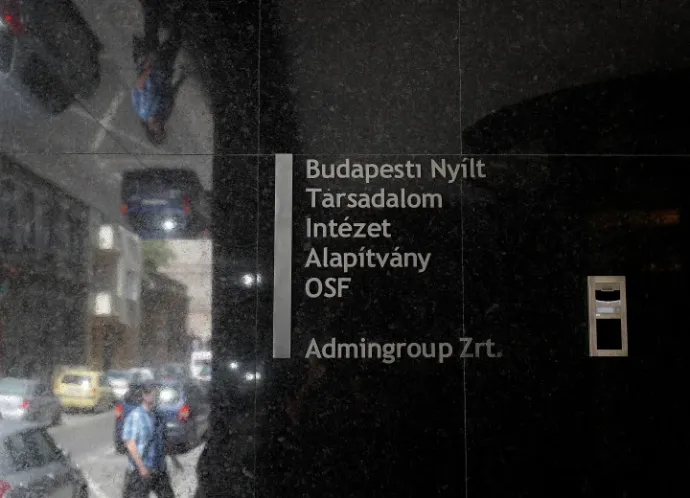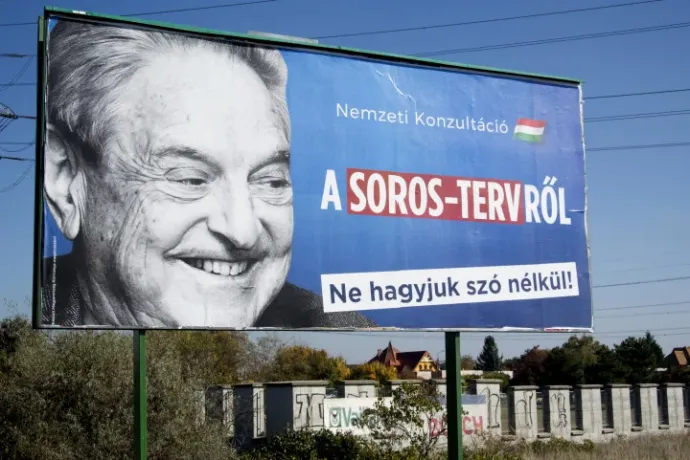"It does not affect us well, but the situation is not dramatic" – Hungarian NGOs could lose considerable Soros funding

Open Society Foundations, the organisation set up by George Soros, is reorganising its operations and will cease a significant part of its activities in the European Union. The decision could affect dozens of Hungarian NGOs that have been under government scrutiny in recent years. Most of them were not caught unawares by the news and have other sources of income to rely on. Following CEU's expulsion from the country,Alex Soros promised that they would hold out until Hungary becomes a democratic country again, while the prime minister's political director says we are still a long way from the last "Soros soldier" leaving Hungary.
Open Society Foundations (OSF), founded by George Soros, will restructure its operations and cease most of its activities within the European Union, Szabad Európa and 444 reported on Monday. The decision was communicated by letter last Friday to all Hungarian organisations that benefit from the Foundations' support.
According to the letter, OSF's management has "decided on a radical change of strategy" in order to maximise the impact of the organisation's resources. The majority of OSF's activities within the European Union will cease from 2024 on, and resources previously directed to Europe will be focused elsewhere in the world.
OSF spokeswoman Alissa Sadler confirmed the news to 444. In a reaction also sent to Telex, she wrote that the recalibration of their European operations is part of a global reorganisation of the organisation. "We will continue to support NGOs across Europe, including the EU's foreign policy groups and the Roma community in Europe; we will promote human rights, democracy and accountable governance in the region, particularly in Ukraine, Moldova, Kyrgyzstan and the Western Balkans, through the work of our national foundations," the spokesperson said, referring to the shift in the focus of activity outside the EU's borders.
The restructuring will involve major redundancies of up to 40 percent, and according to 444, layoffs have already begun in several OSF offices in Europe, including Berlin, Barcelona and London.
It did not come as a surprise to Hungarian NGOs, many had been preparing for it
The Open Society Foundations website lists ninety Hungarian NGOs that have received grants of varying amounts between 2016 and 2021. Some of them are small grants of a few thousand dollars, but others are worth 700-800 thousand dollars at today's prices. It can be said that on average, Hungary receives around $1 million a year, but there have been years when more than that was awarded, and other years when less.
Support from the OSF has helped fund the Hungarian rights advocacy group TASZ and the Hungarian Helsinki Committee, the LGBTQ rights advocacy group Háttér Társaság, the anti-corruption groups Transparency International Hungary and K-Monitor, and the civil watchdog Átlátszó.hu (Direkt36 also received donations earlier). Support was also given to the Igazgyöngy and Romaversitas Foundations, which help Roma education, the Association for the Support of Migrants, the Eötvös Károly Public Policy Foundation, Political Capital, the Women for Women Together Against Violence Association and the Patent Association.
"It does not affect us well, but the situation is not dramatic"
– József Péter Martin, Executive Director of Transparency International Hungary (TI), responded to the news to Telex. We asked some of the Hungarian NGOs how the OSF's restructuring will affect their operations and their future. In recent years, OSF grants have accounted for 15-20 percent of TI's income, never more than 20 percent. Martin stressed that these are not donations, but grants for specific projects, as in EU tenders. "The organisation has several legs, so there is no need for restructuring because of that alone," he added.
Tamás Bodoky, the editor-in-chief of the civil watchdog Átlátszó, was not surprised by OSF's withdrawal, as he said it had been on the agenda for a year or two. "Since our establishment in 2011, we have received an average of 30 million forints a year from George Soros's foundations, and Átlátszó's total annual budget is currently around 200 million forints. In recent times, we have been trying to diversify our donor portfolio in anticipation of this situation," the journalist told Telex.
In recent years, Átlátszó has tried to base the majority of its funding on micro-donations and amounts received from private individuals offering 1 percent of their income tax, which currently accounts for more than 50 percent of its budget. It also receives funding from other international donor organisations, private donors and EU grant funds. As Bodoky sees it:
"There is no immediate need to change the way Átlátszó works, and in the long term we will see – it is an untold story yet."
Háttér Társaság was not surprised by the decision. "In the operation of our association, OSF's support is not decisive, last year it was about 10 percent, and there were several years before when we received no support from OSF at all," Tamás Dombos, the organisation's project manager, wrote to us. The difficulty, according to him, is rather that OSF has been a long-term, flexible donor, "we were able to spend the grant on what we really needed most, in line with the priorities set by our organisation".
They are hopeful that the decision is not final, as the official arguments published in the press in favour of withdrawal (i.e. that "EU institutions and governments are already devoting significant resources to the protection of human rights, freedom and pluralism") are, according to Dombos, "certainly not true in the case of the Hungarian government and the LGBTQI issue"

"In the past five years, OSF has provided about 2 percent of the budget of Menedék Egyesület (Shelter Association)," said President Andor Kováts in response to Telex's question. "A possible withdrawal would not jeopardize the Association's core operations and programmes, our cooperation has always been occasional and related to specific projects. Nevertheless, we would be sad to lose a reliable, professional donor who can help us fill gaps in our activities." OSF also supported the organisation's programme for the school integration of refugee children from Ukraine. "We are confident that we will be able to continue this work next year as planned," Kováts wrote.
Soros organisations and the Soros University in the government's crosshairs
"We Hungarians have historical experience of such issues: we will only believe that the occupying troops are actually leaving the continent when the last Soros soldier leaves Europe and Hungary", Balázs Orbán, the Prime Minister's Political Director, said in response to the news, adding that we are still a long way from a complete withdrawal.
The person of George Soros has been a dominant one in the Hungarian government's communications for more than six years. Two years after the 2015 migration crisis, the government found a publication by the US-based Hungarian billionaire in which Soros proposed, among other things, that European Union member states should take in at least one million refugees a year. Later, seeing the reaction, the billionaire philanthropist wrote about only 300,000, but by then there was already talk in Hungary of a ‘Soros plan’ to resettle one million migrants.
"Let's not allow Soros to laugh at the end!"
– overnight in 2017, blue posters with the portrait of George Soros were plastered across the country, and shortly afterwards the government launched a “national consultation” on the issue. From then on, Soros became an obligatory element of the speeches of governing party politicians, and newspapers, radio and television channels were filled with advertisements attacking him.
Soon, not only was Soros in the government's crosshairs, but a campaign was also launched against Hungarian NGOs supported by Open Society Foundations. Fidesz activists placed stickers on the offices of the Helsinki Committee and several other organisations with the words "This organization supports immigration", and the Parliament passed a law requiring organisations receiving more than HUF 7.2 million (about $21 thousand) in foreign funding a year to display the label "organisation supported from abroad" and to declare the names of their foreign donors. The European Commission launched infringement proceedings against the Hungarian government over the so-called "NGO law", and the European Court of Justice ruled that the law was incompatible with EU law. The government was eventually forced to withdraw the law, designed to target Soros organisations.
Another important moment in the campaign against George Soros was the expulsion of the Central European University (CEU) from the country, which the billionaire opened in Budapest in 1991, as he said, to revive critical and open-minded thinking in the Central and Eastern European region after socialism.
When the Higher Education Act was amended in 2017, legal measures were taken to make it impossible for CEU, referred to in government communications only as Soros University, to continue operating in Budapest. The university tried to comply with the conditions specifically designed against it, but the Hungarian government refused to sign the necessary agreement with New York State. A year and a half later, CEU's management decided to move its US-accredited courses to Vienna in order to ensure the university's viability and to end the uncertainty.
In the same year, the Open Society Foundations, in response to the increasingly depressing political environment in Hungary, moved its operations and around 100 staff from Budapest to a new regional centre in Berlin, Germany.

Viktor Orbán also studied in England on a Soros scholarship
Open Society Foundations operate around the world from the proceeds of George Soros' financial investments. According to the organisation's website, a total of $1.5 billion was spent in 2021 to defend human rights or support the development of democracies.
The largest proportion of resources, 26%, is still allocated to the United States, with $401 million in grants in 2021. This amount was primarily allocated to organizations and individuals working to address deep racial, economic and political inequalities. Europe and Central Asia accounted for 13.5 percent of the total, or $209.4 million.
George Soros set up his first charitable foundation in Hungary in 1984. Until 2007, the initiative, known only as the Soros Foundation, sought to promote regime change in Eastern Europe. For example, the information monopoly of the ruling Hungarian Socialist Workers' Party was broken by distributing photocopiers to independent organisations. During the regime change, the foundation provided substantial funding to the democratic opposition, including the then liberal Fidesz.
Viktor Orbán was able to study at Oxford University in 1989 thanks to a $10,000 scholarship from the Soros Foundation.
The foundation also opened an office in communist China in the mid-1980s, but this was closed down by the authorities in 1989, shortly before the Tiananmen Square massacre. During the regime changes in Eastern Europe, the Foundation opened offices first in Poland, Ukraine, and Russia, then in Albania, the Baltic States, Bulgaria, the Czech Republic, Kazakhstan, Kyrgyzstan, Moldova, Romania and Slovakia.
The list of objectives they have supported in different countries is quite long: contributing to alleviating the damage of the war in South Slavic countries, dismantling apartheid in South Africa, or contributing to the transformation of Myanmar, Indonesia, Pakistan, Afghanistan, Sierra Leone or Liberia. OSF has supported organisations fighting discrimination against minorities, including Roma or Muslims, promoting liberal drug policies, fighting corruption or raising awareness of the harmful effects of climate change.
Alex Soros: I can hardly wait for the day when Hungary will be a democratic country again
George Soros, now 93, announced in an interview published on 11 June that he would hand over control of his financial empire to his son, Alexander Soros. Alex said at the time that he was more political than his father and would continue to support left-wing politicians in America.
"As much as I would like to withdraw money out of politics, as long as the other side does it, we have to do it"
– Alex, who is worried about Donald Trump's return, said and added that as supporters they would do their best to prevent the re-election of the former Republican president.
Alex Soros, 38 first made headlines with his photos at flashy parties, which he posted on social media, and then joined the board of directors of the Open Society Foundations in 2011, when he and his father started working together more closely. He was born and raised in New York and has only visited Budapest a few times. When he was in Budapest in 2019, after the expulsion of the CEU, he said he loved Budapest and Hungary. "I can hardly wait for the day when Hungary will be a democratic country again. Until then, we will hold on," he said of the university.
For more quick, accurate and impartial news from and about Hungary, subscribe to the Telex English newsletter!